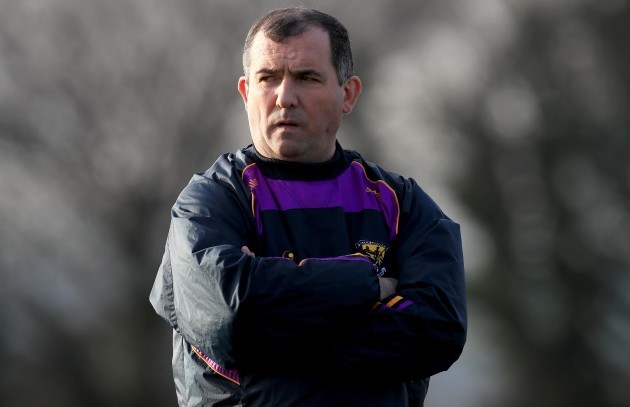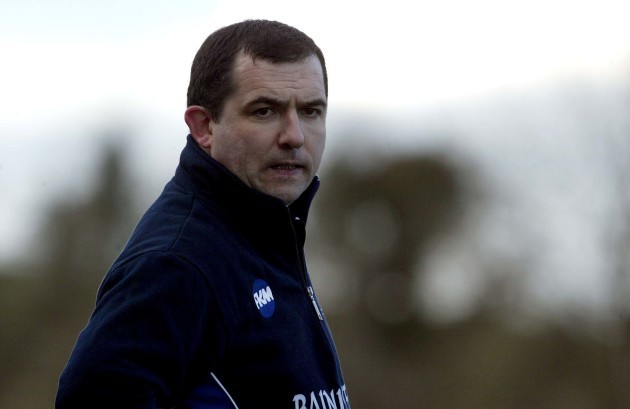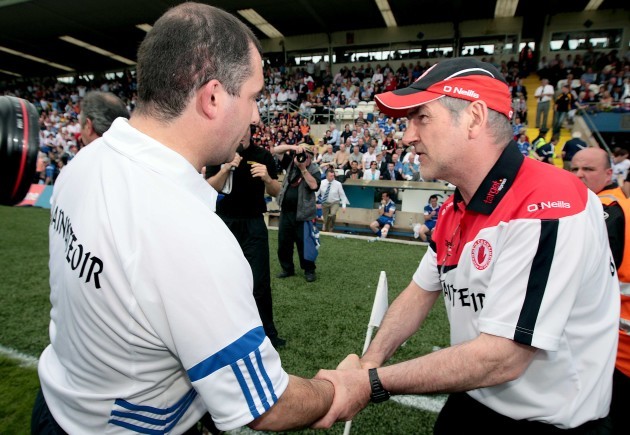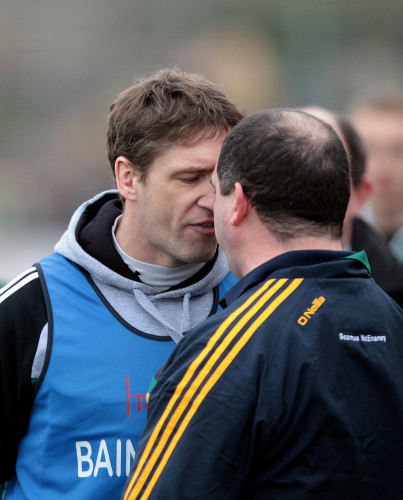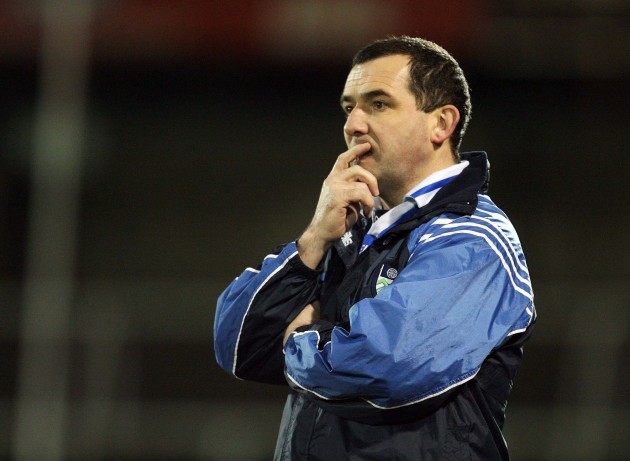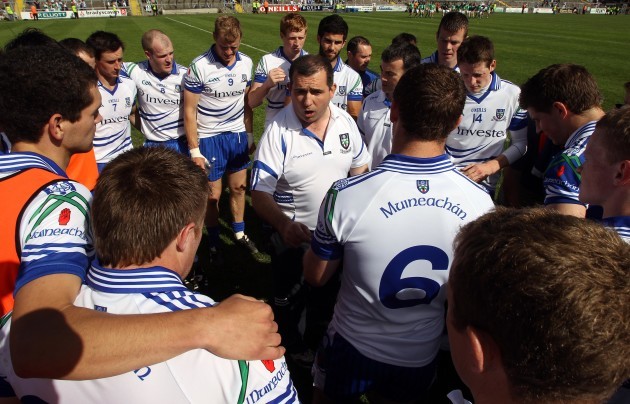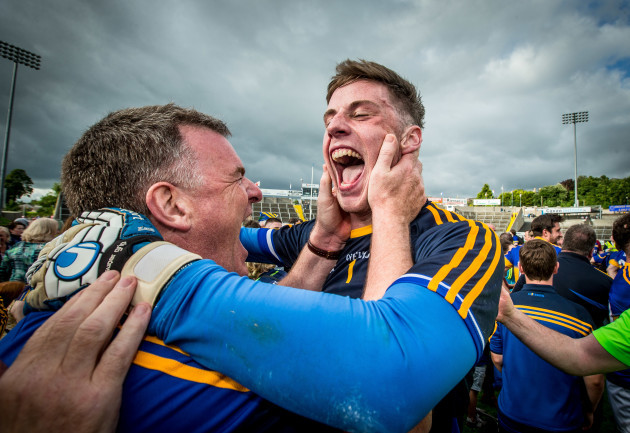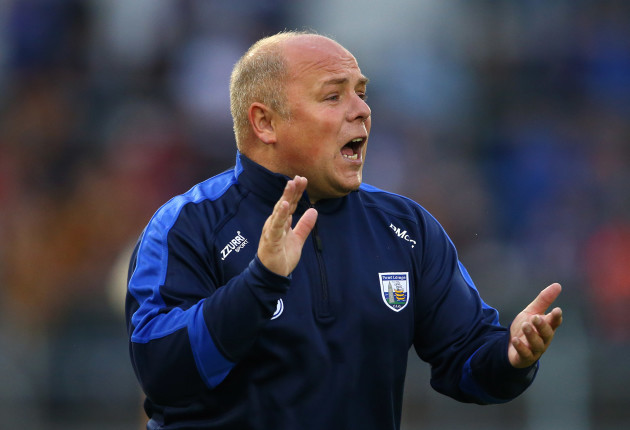SEAMUS MCENANEY CAN pinpoint the exact moment he knew he wanted to go back.
Less than four years out from his high-profile departure from Meath, Banty was on the sideline duty for RTÉ radio at Breffni Park. It was the Ulster semi-final between Monaghan, his old team, and Donegal.
It was a scorcher of a day and as McEnaney watched thousands of supporters streaming in over an hour before the throw-in, the penny dropped. He wasn’t done yet.
“Right when I arrived at that match last year, it was probably the moment when I said, ‘Jeez I’d love to be back at this again.’
“I was there an hour and a half before the game,” he tells The42. “People were starting to come in. I was working pitchside with RTE for that game and there was an unbelievable buzz with 20,000 people there.
“That was probably the moment where I said, ‘I wouldn’t mind being at this craic again.’”
That set the wheels in motion for McEnaney. Four months later, he turn up in Wexford as the new manager of county’s football team.
It was an unexpected move for the Model County to appoint a man who had been in the inter-county wilderness since 2012. But in terms of his CV, the move made perfect sense.
When McEnaney took charge of his native Monaghan in 2005, they had won just two Ulster championship games in six years. Dick Clerkin, who started his career in 1999, had yet to play a championship game in Croke Park.
The Farney were perceived as a soft touch up north, and McEnaney set about introducing some steel into the side.
“We probably recognised as a team around 05 that we were going to have to try and compete with the big boys,” Dick Clerkin told The42 in an interview last November.
“If we just rely on playing nice football we’re only going to get so far. We’re going to have to try to level the playing field any way we could.’
“It was a collective decision. Banty had his physical, intense, robust style of play with a high work-rate.
“There was a focus on, if teams had key players, you weren’t afraid to man-mark them and almost sacrifice your own game to try and nullify key players.”
By the time McEnaney left in 2010, he had brought Monaghan to two Ulster finals and they ran Kerry to a point in the 2007 All-Ireland quarter-final.
Talk to anyone in Monaghan and they’ll agree – Banty laid the foundation for the provincial successes that would come in 2013 and 2015.
2011 was his first year in charge of Meath, where they twice met Kieran McGeeney’s Kildare team in its pomp. The Lilywhites dumped them out in the Leinster quarter-final, and then ended their season in Round 3 of the qualifiers.
The following year, the Meath clubs attempted to oust the Royals boss after their relegation from Division 2 in the spring. But McEnaney survived the coup and brought Meath to within three points of All-Ireland champions Dublin in the Leinster final.
With just a six-day turnaround from running the Dubs close, Meath fell to Laois in the final round of the qualifiers. Five days later, Banty stepped down.
It took time for him to rediscover his love for the game after the painful exit from Meath.
“I’d always intended on going back. I intended to take two years out after 2012, maybe three. I never intended on taking four. Just with work and how busy I was, I just hadn’t that hunger back. Last summer I felt the hunger come back.”
The ambition to succeed has served McEnaney in his life outside sport. He worked in a bar before he was a teenager, and he owned a bar before his 20s.
“I have been in business since I was 19, when I had my own pub.
“Let’s put it this way, I would be a very bad selector. I’ve worked for nobody else all my life, only myself. I’m 30 years self-employed so no other role in a management structure would suit me.”
He was young getting into management too. In 1998 at 30-years-old, McEnaney became player-manager of Corduff, his club team who were in intermediate ranks at the time.
“I felt it wasn’t being done the way I would like it done at our club. I was very fortunate that in my first year in as player-manager we won the intermediate championship for the first time in 100 years. The next year our club played senior football for the first time ever.
“That probably helped, but also what helped me was I had four brothers, three brothers on the team and one as a selector.”
It was a special victory for the McEnaney clan, who lost their father JJ two years earlier. JJ McEnaney trained the club during the 80s and witnessed the club’s junior double in Monaghan in 1993, but he would have loved to see them play senior football together.
Banty had some tough decisions to make that year, as he sought to reign in the squad’s habit of enjoying the finer side of life. The night before his first league game in charge, he got wind that his brother Frank – who was the team captain – and another player were spotted on the tear in Dundalk.
Both men showed up the next morning to find out they were dropped. The tone was set for the season. No indiscipline would be tolerated.
“I had no issues dropping the two lads,” he says. “I would never even mix sport and work. I would have young fellas playing with my club that’s barred out of my nightclub.
“That’s life. I told them, ‘Lads there will be no extra grace just because you’re from my club.’
“I have always kept business and football separate. At inter-county level I would have dropped fellas who would have been from our own area and who would have come to my nightclub. But that’s football. Ruthless but fair.”
And fair he is. His principles for creating a successful team have remained the same throughout is managerial career.
“I’d like to think I bring professionalism and man-management with me. I like to bring unity and create a bond in the dressing room. I believe it’s the manager’s responsibility to have the best players playing with the group.
“I’d like to think I’m quite good at that. We’ve got the best players in Wexford. I had to talk with more experienced players before I took the job to make sure they were going to be there.
“We’ve done bonding days away. Around Christmas we were at Leopardstown at the races together. We went to Johnnie Foxes and finished in Copper Face Jacks.”
Banty has a similar attitude to Tipperary boss Liam Kearns. Last year, Kearns spoke about the “psychological advantage” of celebrating your wins as a team and it’s a school of thought that Banty agrees with.
But that doesn’t mean there are not drinking bans. He feels he strikes a happy medium.
“When we came to the first of January there was a drinking ban for six weeks until the end of the first two national league games. Then we’d a five week drinking ban until we were promoted.
“But then we enjoyed our promotion, and maybe we enjoyed it a wee bit too much! But there has to play time along with hard time. I would like to think I’m very, very firm and very fair. I also like to enjoy the craic with the players.
“There’s never any harm, but I would insist that everybody goes out together. When we got promoted after the London match, the whole lot of us – there was 25 of us – were in a pub in Wexford town for the evening.
“We spent seven or eight hours in it. We got drunk together, we had the craic together, we partied together and got on with training the following Tuesday.”
Derek McGrath sparked a debate about inter-county management back in March when he candidly revealed he has taken parental leave from teaching to focus on the Waterford job.
Banty agrees that managing at this level is more demanding that ever before.
“It’s no surprise to me. I believe there’s only three types of people who can manage an inter-county team – a person that’s retired, a schoolteacher or, to a lesser extent, a self-employed person.
“They’re the only three types of people I think could give the time at inter-county level. It’s a huge commitment. It’s a week’s work.”
Despite admitting that he is more consumed by his job on the Wexford sideline, he admits management will never be as enjoyable as playing was.
“There’s nothing beats playing football,” he says. “I’d say this to any young fella that’s 31 or 32 that’s thinking about retiring. Nothing beats playing football.
“The next best thing is being in a dressing room as a manager with a group of players where there’s a bond and a loyalty.”
The42 is on Instagram! Tap the button below on your phone to follow us!
